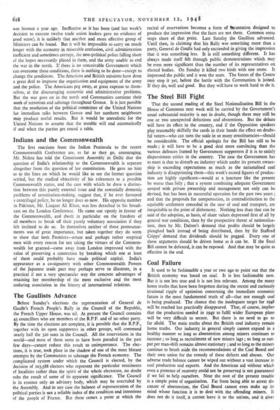Indians and the Commonwealth
The first reactions from the Indian Peninsula to the recent Commonwealth Conference are, as far as they go, encouraging. Mr. Nehru has told the Constituent Assembly in Delhi that the question of India's relationship to the Commonwealth is separate altogether from the question of her constitution. He gave no hint as to the lines on which he would like to see the former question settled, but the studied objectivity of his references to a possible Commonwealth status, and the care with which he drew a distinc- tion between this purely external issue and the essentially domestic problems of constitution-making, suggest that, if he ever favoured a centrifugal policy, he no longer does so now. His opposite number in Pakistan, Mr. Liaquat Ali Khan, was less detached in his broad- cast on the London Conference. He came out openly in favour of the Commonwealth, and dwelt in particular on the freedom of all members to break off their purely voluntary association if they felt inclined to do so. In themselves neither of these pronounce- ments was of great importance, but taken together they do seem to show that both Premiers—astute and perhaps rather sceptical men with every reason for not taking the virtues of the Common- wealth for granted—came away from London impressed with the value of preserving a connection by breaking which one at least of them could probably have made political capital. India's appearance as a co-signatory with other Commonwealth Powers of the Japanese trade pact may perhaps serve to illustrate, in a practical if not a very spectacular way the concrete advantages of retaining her membership of the most exclusive and the most enduring association in the history of international relations.


































 Previous page
Previous page